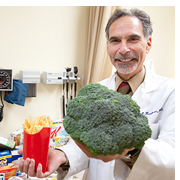Q&A: Are You a Food Lover or Couch Champion?
 |
Robert Kushner, MD, MS, is the medical director of the Center for Lifestyle Medicine and professor of medicine at Northwestern University Feinberg School of Medicine. We sat down with him to talk about his work in obesity care. The following is a combined and condensed version of the interview.
Have you always been a health nut?
No. I got interested in medical school. My first specialty was in diet and nutrition and it expanded from there into weight control. It’s really through my profession and falling in love with nutrition and nutritional sciences and starting to work with the patient population that you personally realize what you do. Then, you begin to walk the walk.
When you’re “walking the walk” do you ever take a break and eat a bag of chips? Do you have a guilty pleasure or a favorite junk food?
No, (laughs) not really.
Seriously? No ice cream?
Well, yes I’ll eat ice cream. But that has to do with what a diet is. A diet is in the totality of everything you eat. So, of course there’s room for everything that you would want to eat. It’s a matter of how often you eat it. Now, personally, I don’t eat red meat. I don’t eat chips very much. Do I eat french fries every now and then? Yeah. Do I have a cookie now and then? Absolutely, because it’s part of my diet.
Given your specialty, do people often mistake you for the “Food Police?”
Absolutely. Sometimes people say, “I can’t eat anything in front of you” or “oh, you’re here, I’ve got to hide what I’m eating.” It happens all the time and I usually laugh. No, I’m not going to handcuff them or take them away. It’s not a misdemeanor.
What type of patients do you treat?
Essentially all of the patients I see have a weight-related problem, and that’s why they’re referred to me—for weight loss. I’m seeing patients who are overweight or are obese and have developed one or more medical problems associated with their weight, which often includes Type 2 diabetes, hypertension, coronary artery disease, sleep apnea, arthritis, breast and uterine cancer and fatty liver disease.
What are your thoughts on the current state of obesity care in America?
Statistically, two out of every three patients are overweight or obese. The current status is clinicians, primarily physicians, are not having the conversation with their patients about weight and how to manage it. Clinicians have the opportunity to engage patients in improving self-care, but they don’t always know where to start.
Is that why you’re developing a Lifestyle Patterns study?
Yes. A particular area of mine is using what I’ve coined as patterns or Lifestyle Patterns. Everyone develops a set of habits or patterns that work for them, and we can identify them through our questionnaire. As the study has evolved, we’ve found six cluster behaviors people identify with in influencing weight management:
- Accidental Diner - someone who eats mostly convenience foods and fast foods
- Fast Pacer - someone who has other priorities and distractions making it difficult to prioritize to take care of their self
- Food Lover - someone who eats out of emotion, does not get a stop signal or eats large portions of food without controlling their intake
- Couch Champion - someone who leads a relatively sedentary lifestyle and may be inactive because they do not like to exercise or don’t want to exercise
- Self-Scrutinizer - someone who has body image disturbance, is unhappy with their body, tends to be shy and unwilling to participate in things because they are so conscientious of their body shape/image
- All-or-nothing-doer - someone who is on and off a diet, yo-yoing or a weight cycler
How does the study work?
The study looks at the prevalence of unhealthy lifestyle patterns amongst overweight and obese adults in three behavioral domains: eating, exercising and coping. Right now I’m testing and modifying the questionnaire that I hope will someday be used by physicians in an office setting.
What’s the goal of developing the questionnaire and identifying unhealthy patterns?
The ultimate goal is to develop a quick and practical questionnaire that can be filled out by patients prior to seeing their clinicians, and within minutes, the clinician knows where to spend his/her time so that patient can walk out with more knowledge and direction with how to begin to manage their weight. Let’s say you identify with two of the six patterns. Then, we can take the sense of weight control being overwhelming away by saying here are the two patterns I want to work on. All of a sudden, it’s like, ok, I can do that.
What’s the biggest mistake people make in trying to start a weight loss plan?
Many people think that when it comes to physical activity they have to sweat all at once. Accumulating physical activity can mean lots of things including walking your dog, taking the stairs instead of the escalator or brisk walking during a break at work. The minimum goal for healthy Americans is to accumulate about 30 minutes a day of moderately vigorous activity for five days per week. That’s what you want to do as a baseline for health. Most people can split that into 10-minute intervals if they look through their day.